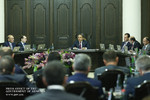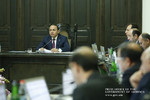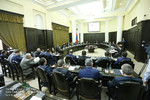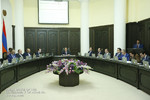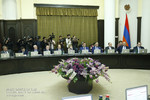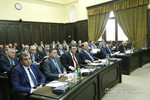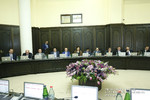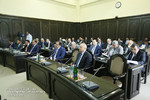Thursday, 12 May 2016
Hovik Abrahamyan: “The government has enough political will to implement all the necessary steps”
A regular Cabinet meeting was held today, chaired by Prime Minister Hovik Abrahamyan.
Before proceeding to the agenda, the Prime Minister made a statement.
“Dear Colleagues,
The four-day war has forced all of us to rethink our work and refer once again to the President’s speech of February 12, 2016.
Are we developing? Are we fighting against corruption? Do we have an efficient army? The answer is yes. The question is whether is it enough to face new challenges? I feel that I will express a shared opinion if I say not.
We need to become a more efficient State by doubling and tripling our efforts. Yes, our resources are limited, thought, in my opinion, the lack of resources can be offset by two factors, the first is the use of more effective models, and the second is how long they will take to come into effect.
During a recent question and answer session at the National Assembly, I noted that we were going to initiate a series of discussions involving members of parliament, including the opposition, as well as other social actors. But what matters most is the speed at which we will implement the decisions adopted during the proposed discussions, which will cover a wide range of items, including economic development, fighting corruption in healthcare and education and many other issues.
From the 14th day of this month, we are proceeding to regular weekly discussions. As it appears to be impossible to involve all interested parties in this process, I suggest that all those who have recommendations to make should submit them to Minister-Chief of Government Staff David Haroutunyan. His e-mail address is available at the Government’s official website.
I should note that there are several noteworthy studies into Armenia’s development scenarios. A vivid example is the Gulbenkian Foundation-published “Armenians in 2115” report. I do believe that studies to that effect should become a subject of in-depth consideration.
Of course, discussion is not an end in itself. Each discussion should lead to specific actions, a government decisions or a legislative initiative within a short time span. We have already identified a number of problems and developed relevant solutions. Here, I would like to announce some approaches.
Firstly, although we have a finalized budget, we need to resort to a stricter regime of savings. We must form a less expensive apparatus of government. We need to reduce those costs that do not materially affect the actual result - business trips, maintenance costs, repairs, utilities, service cars and so on.
Some of the aforementioned steps need to be taken today. In this regard, I instruct the Ministry of Finance and the Government Staff to come up with proposals and recommendations at the next Cabinet sitting.
Secondly, the State management apparatus should become more compact. Indeed, this will take more than a day to complete, but we need to have a detailed analysis before the start of the 2017 budgetary discussions. The public sector optimization effort will cover SNCO, PIU, affiliated agencies and standalone units. I look forward to having sober and realistic proposals on the part of government agencies.
To ensure that the proposed activities are carried out in a systemic and well-organized manner, I hereby suggest that the Deputy Prime Minister submits a draft government resolution on the establishment of a working group under his leadership. I believe that this approach should be adopted by our colleagues from other branches of government.
Dear Colleagues,
I am fully aware of the fact that these two approaches may cause certain social tension associated with the reduction of jobs in government agencies. But, let us be outspoken: the above considerations have prevented us from making such a move for the past many years. Today, however, the issue of security of Artsakh and Armenia poses other problems. The situation we have is a non-standard one, which compels us to resort to non-standard steps and make non-standard decisions.
The third area where tangible results can be achieved with the shortest possible delay is the fight against corruption. First of all, let us state the following two key principles. Corruption should be subject to separate measurement, including through public opinion polls. Both public agency supervisors and law enforcement authorities must come up with public reports based on the dynamics of corruption indicators. We will draw relevant conclusions, which may include personnel changes, should figures get worse or remain unchanged. In this connection, the public’s expectations and the proposed solutions will be discussed during upcoming meetings.
The second principle is the conflict of interest. We need to introduce stringent mechanisms that might rule out the participation of public officials and persons associated with them in State programs and State procurements.
Dear Colleagues,
As the head of the executive, I am fully aware and understand that all the aforementioned measures will prove ineffective if we fail to provide for lasting and sustained economic growth. They should help attract additional financial resources, create new jobs and alleviate the social tension.
Over the past 2 years, I have repeatedly faced public criticism about the lack of political will to fight against monopolies. I agree that the Government has not shown sufficient consistency in exposing the monopolies and has failed to initiate a public dialogue in good time. Now, the time has come to get things right.
I hereby instruct the Minister of Economy and suggest that the Economic Competition Protection Commission should cooperate with Armenia-based international organizations in the shortest possible time - 3 weeks at maximum – in a bid to analyze the situation with the monopolies operating in Armenia, assess their impact on free competition and propose relevant solutions;
I am also urging the newly formed State Revenue Committee to ensure adequate budget receipts, implement soft management practices with regard to small and medium enterprises, provide for efficacious risk management in tax and customs administration, minimize interference in business activities and create equal conditions for economic entities.
Please rest assured that we will solely abide by considerations of economic expediency. This is all for the time being.
In conclusion, let me emphasize once again that the Government has enough political will to implement these steps. We will henceforth review the steps completed on a regular basis and assess only the most specific results.”
The Government approved amendments to the Labor Code of Armenia, under which additional labor guarantees will be instituted for the volunteers taking part in the hostilities unleashed by Azerbaijan since April 1, 2016 in breach of the 1994 ceasefire agreement. The amendment provides for preservation of jobs and relevant remuneration for all those salaried workers engaged in military operations as volunteers. The legislative changes will have a retroactive effect covering the relationship emerged since the outbreak of hostilities on April 1.
The meeting next amended a previous decision to provide vulnerable families with additional 61 064 digital DVB-T2 TV receivers free of charge.
The Government approved the concept of alternative child care services, which will set the new types of services, the main directions and principles.
The Cabinet established a procedure for Armenian employers to hire foreign employees, grant and reject requests of work permits, pay out reimbursement of expenditures should they fail to provide an adequate job, as well as the list of documents required for issuing work permits and the inventory of those highly qualified jobs that foreign professionals may be assigned without a work permit.
The meeting endorsed the loan agreement of May 12, 2016 between the Republic of Armenia and the International Bank for Reconstruction and Development, referred to as “Program of financial rehabilitation of the energy sector.” The agreement provides for the grant of a loan in the amount of USD 30 million.
In conclusion, the Government approved the proposals on signing the following agreements: Agreement between the Government of the Republic of Armenia and the Government of the Republic of Bulgaria on cooperation in the fields of information technology, e-governance and communication; Agreement on cooperation between the Government of the Republic of Armenia and the Government of the Republic of Tajikistan in the fields of youth affairs and sports.







